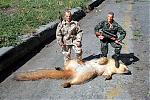A Conversation with Dr. Douglas Porch
Entry Excerpt:
A Conversation with Dr. Douglas Porch:
Relooking French Encounters in Irregular Warfare in the 19th Century
by Michael Few
Download the Full Article: A Conversation with Dr. Douglas Porch
To complement the recent interviews conducted by Octavian Manea, we reached out to the defense analysts experts at the Naval Postgraduate School in Monterey, CA. In the first interview of this series, Dr. John Arquilla described how he felt that French Encounters with Irregular Warfare in the 19th Century can inform COIN in our time. This rebuttal comes from Dr. Douglas Porch, a historian in the National Security Affairs (NSA) department. This department specializes in the study of international relations, security policy, and regional studies. NSA is unique because it brings together outstanding faculty, students from the Army, Air Force, Navy, Marines, National Guard and various civilian agencies, and scores of international officers from dozens of countries for the sole purpose of preparing tomorrow's military and civilian leaders for emerging security challenges. Notable alumni from the NSA department include LTG William H. Caldwell.
Download the Full Article: A Conversation with Dr. Douglas Porch
Douglas Porch earned a Ph.D. from Corpus Christi College, Cambridge University. Currently, he is a Professor of National Security Affairs at the Naval Postgraduate School.
--------
Read the full post and make any comments at the SWJ Blog.
This forum is a feed only and is closed to user comments.







 .
. 




Bookmarks